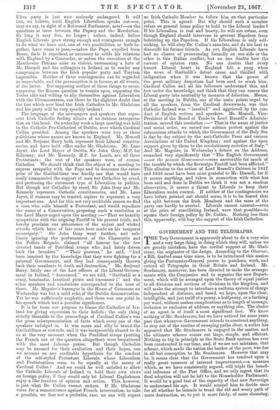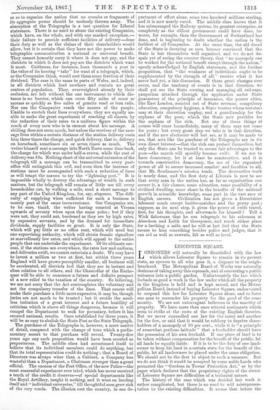GOVERNMENT AND THE TELEGRAPHS.
THE Tory Government is apparently about to do a very wise and a very large thing, in doing which they will, unless we are greatly mistaken, have the cordial support of Mr. Glad- stone, the originator of the design. According to the Observer, a Bill, drafted some time since, is to be introduced this session giving the Postmaster-General power to purchase, work, and extend all Telegraphs in Great Britain and Ireland. Mr. Scudamore, moreover, has been directed to make the arrange- ments with the Companies and to organize the new Depart- ment, which will be arranged upon the theory of equal justice to all divisions and sections of divisions in the kingdom, and will make the attempt to introduce a uniform system of charge independent of distance, and based, we hope, upon the clear, intelligible, and just tariff of a penny, a halfpenny, or a farthing per word, without useless complications as to length of message, inclusion or exclusion of address, or anything else. The choice of an agent is of itself a most significant fact. We know nothing of Mr. Scudamore, but we have noticed for some years past that whenever Government intends to construct anything, to step out of the routine of sweeping paths clear, a notice has appeared that Mr. Scudamore is engaged in the matter, and • the ultimate scheme comes out large, simple, and efficient. Nothing so big in principle as the State Bank system has ever been constructed in our time, and, if we are not mistaken, that scheme, which made the nation the banker of the poor, was due in all but conception to Mr. Scudamore. However that may -be, it seems clear that the Government has resolved upon a really great measure of internal improvement,—a measure which, as we have consistently argued, will triple the benefi- cial influence of the Post Office, and we only regret that its final adoption will not be left to the Householder Parliament. It would be a good test of the capacity of that new Sovereign to understand his age. It would compel him to decide once for all whether he intends to tread the old and weary path of mere destruction, or, to put it more fairly, of mere cleansing, or so to organize the nation that no crumbs or fragments of its aggregate power should be uselessly thrown away. The absorption of the Telegraphs is a test question for Liberal statesmen. There is no need to abuse the existing Companies, which have, on the whole, and with one marked exception,— their failure to provide sufficient facilities of delivery—done their duty as well as the claims of their shareholders would allow, but it is certain that they have not the power to make telegraphic communication a national or universal benefit. They cannot honestly carry it where it does not pay, and the districts in which it does not pay are the districts which want it most. Caithness, for instance, loses thousands a year in the value of its herring "take" for want of a telegraph, which, as the Companies think, would cost them some fraction of their dividend. The case is the same in parts of Wales, and, indeed, in all districts which lead nowhere and contain no great centres of population. They, overweighted already by their seclusion, are left without the one instrument to which dis- tance is no barrier, which can cross fifty miles of moor or morass as quickly as five miles of granite road or iron rails. Nor can the Companies reach the masses of the people. Unable to stretch their lines everywhere, they are equally un- able to make the great experiment of reaching all classes, by the reduction of their rates to a uniform figure within the reach of every Mall who is in earnest about his message. A shilling does not seem much, but unless the receiver of the mes- sage lives within a certain distance of the station delivery costs him three times the charge, and quick delivery, that is, delivery on horseback, sometimes six or seven times as much. The writer himself sent a message into North Essex some time back, the charge for which was under half-a-crown, while the cost of delivery was 19s. Nothing short of the universal extension of the telegraph till a message can be transmitted to every post- office will extinguish this evil, and even then the increase of stations must be accompanied with such a reduction of fares as will tempt the masses to try the "lightning post." It is impossible wholly to destroy the advantage of wealth in such matters, but the telegraph will remain of little use till every householder can, by walking a mile, send a short message to any part of the United Kingdom, for, say, sixpence. The diffi- culty of supplying wires sufficient for such a business is merely part of the same inconvenience. Our 'Companies are, to be sure, timid, the writer having counted at Vienna upwards of seventy wires upon the same poles ; but if they were not, they could not, burdened as they are by high rates, by expensive servants, and by the demand for immediate dividends, supply facilities so great. It is only the State, which will pay little or no office rent, which will need but one supervising authority, which will obtain female signallers at marvellously low rates, and which will appeal to the entire people that can undertake the experiment. Of its ultimate suc- cess, if the stations are everywhere, the rates low and uniform, and deliveries swift, we cannot entertain a doubt. We may have to invest a million or two at first, but within three years England will have grown perceptibly smaller, all business will be accelerated, all districts feel that they are in instant and close relation to all others, and the Chancellor of the Exche- quer will be able to announce a future and definite prospect of a new relief to the taxation of the country. So believing, we are not sorry that the Act contemplates the voluntary and not the compulsory transfer of the lines. That course will make their purchase a little more expensive, it may be, though juries are not much to be trusted ; but it avoids the need- less irritation of a great interest and a future hostility of criticism which is above all things dangerous, because it will compel the Department to seek for pecuniary, before it him secured national, results. Once established for three years, it will be as easy to abolish the State Post as the State Telegraph.
The purchase of the Telegraphs is, however, a mere matter of detail, compared with the change of tone which a parlia- mentary assent to that purchase will reveal. Twenty-five years ago any such proposition would have been scouted as preposterous. The middle class had accustomed itself to believe that its individual members could do anything, but that its total representation could do nothing ; that a Board of Directors was always wiser than a Cabinet, a Company less wasteful than a Department, a Chairman stronger than a great official. The success of the Post Office, of the new Police—the most successful experiment ever tried, which has never received a tenth of the credit it deserves—of special departments like the Royal Artillery, taught it nothing, and it went on lauding itself and "individual enterprise," till thoughtful men grew sick of the very words. The illusion cost the country, in one de- partment of effort alone, some two hundred millions sterling, and it is now nearly cured. The middle class knows that it has mismanaged the Railway system, its greatest enterprise, as completely as the silliest government could have done, far worse, for example, than the Government of Switzerland has done, and is beginning to doubt whether the nation is the feeblest of all Companies. At the same time, the old dread of the State is decaying as men become convinced that the State is but themselves well organized, and we do not de- spair yet of seeing the counter theory, that "no monopoly can be worked for the national benefit except through the nation," openly acknowledged by English statesmen, and the further proposition, that "the weakness of individuals ought to be supplemented by the strength of all," receive what it has never had yet, a fair discussion. If those great changes ever occur, and the tendency of events is in that direction, we shall yet see the State owning and managing all railways, pauperism attacked through the application under State guarantees of the principle of insurance, the poorer cities, like East London, assisted out of State revenue, compulsory education, compulsory hygiene, a State trustee whom testators may at their discretion employ, and a guardianship for the orphans of the poor, which the State now provides for the orphans of the rich. Not one of these things of course will come immediately, many of them may not come for years ; but every great step we take is in that direction, and if the new electorate will but see, as it may be made to see, that acts like the purchase of the Telegraphs are in its own direct interest—that the rich can protect themselves, but only the State can be trusted to secure fair advantages to the poor—the march will speedily become swift. If we are to have democracy, let it at least be constructive, and it is towards constructive democracy, the use of the organized power of all to secure increased comfort and faculties to all, that Mr. Scudamore's mission tends. The destructive work is nearly done, and the first duty of Liberals is now to see that every man in the nation has, as far as organization can secure it, a fair chance, some education, some possibility of a civilized dwelling, some share in the benefits of the national growth in scientific knowledge, some part in the vast race of English careers. Civilization has not given a Dorsetshire labourer much except lucifer-matches and the penny post ; suppose, as its next step, it gives the power of swift travel, first, for his thoughts, and afterwards for himself ? Tell a Wick fisherman that he can telegraph to his salesman at Aberdeen and Leith for threepence, and reach either place for a farthing a mile, and he will at last feel that the State means to him something besides police and judges, that it can aid as well as restrain, lift as well as level.



































 Previous page
Previous page